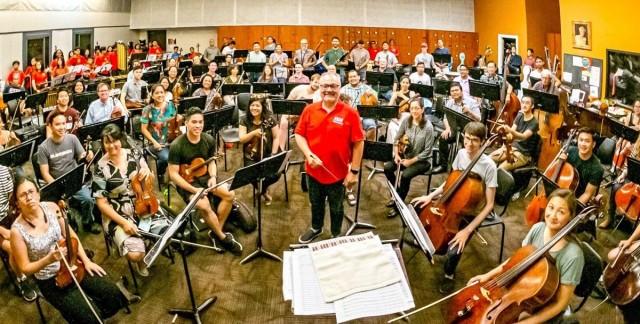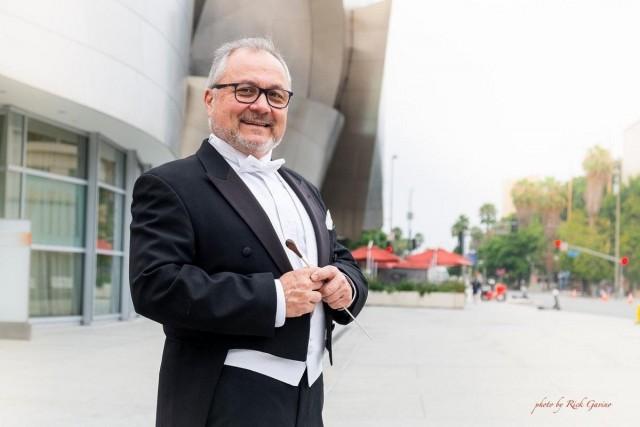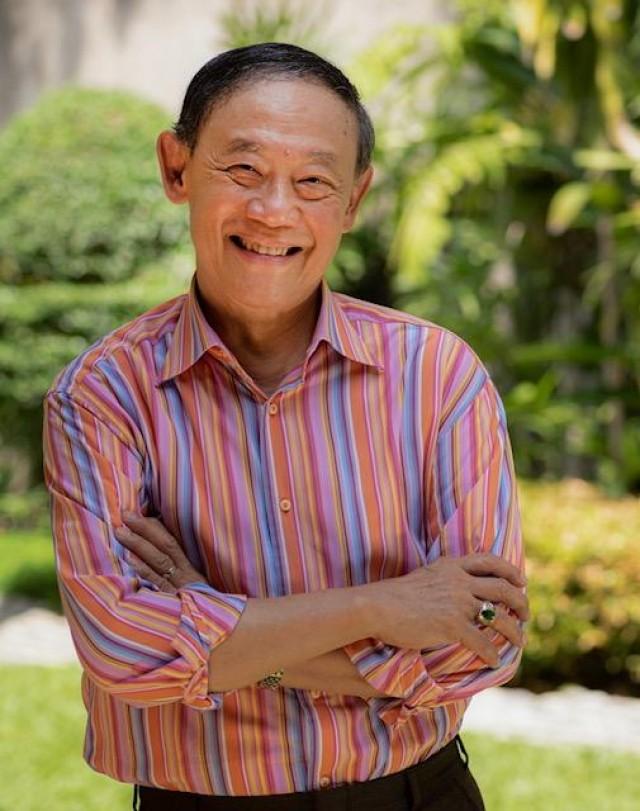Filipino American Symphony Orchestra celebrates the music of Jose Mari Chan

LOS ANGELES — "I was born a romantic," the award-winning singer-composer Jose Mari Chan told us when we interviewed him by Zoom.
"I grew up romantically. Yes, I'm essentially a romantic person, and I've never lost that sense of romance. I've never lost that sense of wonder, that sense of Peter Pan. So, I'm the boy who grew up but never grew old."
Now 77 years old, the charismatic songwriter has never lost that glitter in his eye, his boyish charm, infectious smile and that tone of excitement in his voice especially when he is talking about music.
We first became a fan of the music of Chan ever since he won the Tokyo World Popular Song Festival in 1973 with his song, "Can We Just Stop And Talk Awhile."
Chan sings effortlessly and with sincerity that you feel he is singing only for you. His lyrics are simple but from the heart that one can easily fall in love with its beauty and charm.
The prolific songwriter who has penned several hits like "Beautiful Girl" (1989, which was also covered by Martin Nievera, Christian Bautista, Parokya Ni Edgar and Ben & Ben), "Can't We Start Over Again" (1989), "Deep in My Heart"/"Leave You" (1969), "Please Be Careful with My Heart" (1989, featuring Regine Velasquez), "My Girl, My Woman, My Friend" (1988, featuring Janet Basco) among others.
He has composed more than 20 songs for movies that earned him recognitions and nominations. He has also written several well-loved and catchy commercial jingles like "Love at Thirty Thousand Feet" for Philippine Airlines, the Knorr Chinese Soup jingle and the Alaska Milk jingle.

On August 20 at the Walt Disney Concert Hall, Chan will be honored by the Filipino American Symphony Orchestra (FASO), which is the first and only Filipino American symphony orchestra outside of the Philippines. A concert, entitled "Celebration! Featuring the Music of Jose Mari Chan," will be held showcasing most of Chan's music.
"We are premiering new arrangements of several kundiman songs, which are traditional Filipino love songs. We commissioned several emerging arrangers to give these well-loved melodies a fresh new sound," said Louie Ramos, Education Director and Arranger-in-Residence of FASO.
"Almost all of Chan's musical pieces will be orchestral and only three will have vocals," Ramos added.
Chan will not be performing but simply attending and will be honored with an Excellence in Music Award to be given to him by FASO "for his decades-long career and accomplishments as an internationally awarded singer/songwriter."
Also performing that night would be The Philippine Meistersingers, the FASO Youth String Ensemble, the FASO Youth Orchestra, soloist Irene Castillo, vocalists Felson Palad and Deb Victa, and the FASO Kids namely Ardyanna Ducusin, Stazy Reoma, and Iesha Ringor.
Some of the Jose Mari Chan songs that will be performed by the orchestra and the vocalists will include: "Sing My Your Song Again Daddy" (to be sang by Ardyanna Ducusin, Stazy Reoma and Iesha Ringor), the "Jose Mari Chan Overture" (orchestra only, includes "Can We Just Stop and Talk Awhile," "Constant Change" and "Beautiful Girl"), "Let's Just Stop and Talk Awhile"(orchestra only), "Refrain" (orchestra only), "My Girl, My Woman, My Friend" (orchestra only), "Afterglow" (orchestra only), "I Remember the Boy"(orchestra only), "Hahanapin Ko" (orchestra only), "Please Be Careful With My Heart" (orchestra only), "Good Old Fashioned Romance" (orchestra only), "Minsan Pa" (vocals by Deb Victa), "Christmas in Our Hearts" (vocals by Felson Palad and Deb Victa), and "Big Beautiful Country"/"Love at 30,000 Feet" (orchestra only).

Maestro Robert Shroder, the conductor and musical director of FASO, shared how Chan and he met.
"I was a flutist at the Manila Chamber Orchestra, and we met during rehearsal time. We shared stories and one day, he called me if I can join him for his album recording of 'Constant Change.' I also did a Christmas album with him and a few more singles and commercials. In fact, I did the arrangement for the jingle for the Sony commercial. I also became a part of his Christmas album."
"We became very close, and we saw each other. Then when I went to the US, we lost contact. Before COVID-19, I reached out to him to ask permission if we could play his music. He is a very good person. He has a lot of very good music and so he deserves to be given a tribute. He also became very popular with his Christmas songs here in the US and in the Philippines."
"This tribute was supposed to happen two years ago but because of COVID-19, it didn't. So, on August 20, we will pay tribute to him, and his songs and we will give him an award onstage. He deserves it. He is also very grateful. He called me and said, "I would like to thank you and FASO for the tribute. Usually, people give tributes to people who are already gone. So, I am very grateful that you are giving me this tribute while I am still alive."
"His music is very exciting to play. Though it is pop, the way he approached his songs is like classical in tune. He is very particular with his tunes. He is one-of-a-kind, very different, and very amazing. We hear different genres in his music like sometimes they sound like the Carpenters, or the Beatles. There is a manifestation of different tunes. His music is so global in nature. That is the genre of Jose Mari Chan. While we were rehearsing his songs, the artists during rehearsals said the music is so exciting. They were very excited to play his music in this concert. Jose Mari Chan will be there with his family, and we hope that all Filipinos and non-Filipinos will join us."
We interviewed Chan and below are excerpts of our interview.
Congratulations on your tribute and special award by FASO. What is the significance of this honor to you?
At my age, a tribute is extra special. When you are younger, you take it for granted. "Oh yeah. Well, my song is popular, so they'll pay me a tribute." No. But as I get older, I appreciate it more because that means that's a wider range of audience follow my music. And to be interpreted by an orchestra like FASO, the Filipino American Symphony Orchestra, it's a great honor. And I'm looking forward to hearing how they interpret my songs instrumentally, how they arranged my songs, and essentially retaining the character of the song, but with a different twist. So, I look forward to that. I'm excited."
Have you heard of FASO before?
I knew Mr. Robert Shroder before, when he was still living in Manila. He was part of the Manila Chamber Orchestra. But I've never heard FASO perform, so this is my first time.
You composed your first song at age 13. What is the most important composition for you? What is the closest composition to your heart?
I have a few favorites. But my songs are like my children. Each one is special. Each one has been blessed with his own talent, his own gift. So, I will be happy to see one of my children becoming president of a bank, another one becoming a successful architect, or another one a neurologist or a cardiologist, and another one is a professor at the Ateneo or UP. So, if you ask me what my favorite composition is, it would be a little bit difficult for me to say that this child is my favorite. Each song is unique. But if you have to, let's say, identify songs that have become successful. There's one called "Refrain," which has been recorded in New Zealand by an Australian artist. It has been recorded in Tagalog, and it's one of the songs that I wrote for my wife just the year before we got married. So, it has a special significance.
The melody sounds Italian, Spanish music, because it is a compendium or whatever. It's like putting fruits into a food processor and you come out with a juice. "Refrain."
You also composed this song, "Can We Just Stop and Talk Awhile," which won the Tokyo World Popular Song Festival. Who was your inspiration for this song?
One day I was walking into a coffee shop many, many years ago. I was already married, by the way, and my wife knows this story. But anyway, so I noticed a pretty girl seated at a table by herself. To go to the conclusion, I never met her. I never approached her. But in my imagination, I said if I were single, I would've gone to her and say, "Hi, may I share this table with you? Can we just stop and talk awhile?" And so, I just developed the idea. Maybe then we could go for a ride, drive down to the countryside, get away from this gray and frenzy early burly of the city life. Early yet to say what lies ahead. It's the first day of the rest of our lives. Can we just stop and talk a while?

You're such a poet as well. Songwriting also includes poetry, and you're a good poet yourself.
Thank you, Janet.
You have also written a lot of Christmas songs, and you are dubbed as the "Father of Christmas Music." Why Christmas?
Janet, this early on, let me say that I am not the father of Christmas music, nor am I the father of Filipino Christmas music. Long before I was born, there were already beautiful Christmas carols written by Filipinos. I refuse to be called father of Christmas music. But I've been blessed that my Christmas song, "Christmas in our Hearts," after 32 years, continues to be sung by young and old people alike. And it has become popular also in other countries. So, it's a blessing from God. Music is God's gift. And what I do with a gift is my gift back to God.
Now that you're 77, how do you take care of your physical and mental health, and what does music mean to you at this stage in your life?
I do my treadmill every morning. Not that long and not brisk. Thirty-five minutes, that's all. Just to perspire and to get my heart going. I watch the food that I take. I limit my cholesterol and my sugar. That's a contradiction, because I'm in the sugar business, an irony. I'm in the sugar business. I'm encouraging people to take sugar, take your soft drinks. But personally, I take diet soda.
You have been married for a long time to Mary Ann Ansaldo.
Yeah. Mary Ann and I have been married 52 years now.
So, what is the secret of your long and happy marriage?
The secret is being each other's best friends, and you share experiences together. Because I have friends, for example, who loves to play golf. And so, they go out sometimes to play golf the whole day, and then their wife would just be at home.
I believe in sharing experiences together. So, if I enjoy traveling, I only travel with my wife. If I enjoy watching movies, I watch it with my wife. Because with those experiences, you grow together. It's like two planes flying side by side. One of the planes decides to veer one degree to the left. Not much. One degree. Not much. But after three hours, you won't be able to see each other anymore, because you've drifted apart.
So, when you are doing things separately, you tend to grow apart. I encourage couples to do things together. I think that our 52 years of married life was also helped by the fact that we lived in the United States for 11 years. I worked and lived in New York for 11 years. And at that time, the weekends were exclusively ours, our family's.
Unlike in the Philippines, weekends, you have socializing, you have Jaycee's, you have the Rotary Clubs, you have friends, you play golf, etc. But in the US, your associates, they have their own families. Your business friends, they have their own families. So, weekends belong exclusively to the family, and you do things together. So, after 11 years, when we came back to the Philippines, we discovered that our family has become closely knit. And many of our friends in the Philippines were separated. Looking back, I say, yeah, it's important to do things together always.
Very good advice. So, if you had a chance to talk to your younger self, what would you say to your younger self?
I would tell my younger self to continue to do the music as a hobby, but put your attention also in the business, because that's what will sustain the family. So, your career is important, but the music as a hobby, as a passion, cannot be abandoned. It's part of you. You will not be true to yourself if you don't nurture it. So, nurture your passion.
—MGP, GMA News




